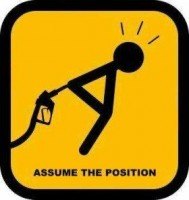Question of the Day: What's Causing High Fuel Prices?
NPR's Market Place recently featured on an economist who said gas prices don't follow any rational economic pattern. Supply has nothing to do with demand, and vice-versa. Wonderful. TTAC contributor and former Car and Driver ME Stephan Wilkinson emailed me this morning on the same topic. "Opinions, of course, range all the way from simple supply-and-demand to Vast Right-Wing Conspiracy, with all sorts of goofball imaginings in between." Personally I like the Vast Right-Wing Conspiracy idea, but there's probably more to it than that. But how would I know? Wilkinson goes on, "There's an interesting piece in the new Conde Nast Portfolio, 'Crude Reporting,' on how bad a job simplistic journalists have been doing with the subject, at least in part because newsrooms are staffed by a generation of Reaganomics enthusiasts who believe that the market rules, whereas back in the old days, reporters were 'the redistribuionist children of the New Deal and the AFL-CIO.'" Well, if this is the same "generation of Reaganomics enthusiasts" who didn't once bother to ask Judith Miller if she was, you know, making shit up during our march to war, then a bit more is illuminated. Your thoughts?


































Comments
Join the conversation
Landcrusher: Also, still waiting for a good definition of “reserves” from anyone who wants to argue the US can’t produce enough to make a difference in the world price of oil. So you don't want "oil independence", being merely willing to settle for a "difference in the world price of oil"? If so, what a low bar you set! All you have to do is withdraw a portion of your own 5.something million barrels of oil per day from the market and watch the price rise. You can also pull a Saudi Arabia and try to pump more per day of what little you have left. In a rational market, you'll see the price go down. You will find you will have a significantly harder time at the latter than the former though. You will work very hard to a modest change: the law of diminishing returns at work. Neither of these depend on the definition of "reserves" either. Flipping to a high bar, "oil independence": since the USA is not anywhere near as endowed with oil as Saudi Arabia or Canada is, it's safe to say, short of a colossal disaster, the USA will never be truly oil independent ever again. (Google up Einstein's definition of insanity.) For an achievable goal, I suggest a small notch down from "oil independence" to "energy independence". Classic economic substitution, and fully supported by the laws of geology, and physics. Best of all, it would stick it just as hard to the KSA, OPEC, and even Canada. http://www.youtube.com/watch?v=feOM_Va-JZ4
Pch101 Are you saying that the equilibrium price that's determined by a short-term demand was not motivated by economic fundamentals? Yes, the demand will change with time, which will put downward pressure on price, but for now what we get is indeed short term supply and demand interactions. Please stop mentioning the housing bubble. "Economic Fundamentals" is what the end users are willing to pay for the end product. The housing market is different from the market for oil or say tomatoes. The present value of a share of stock or a house is the sum of all expected returns rendered during the asset's lifetime, and asset's lifetime is indeed very long time, and I can see that it is totally feasible that the current price of the asset will become decoupled from its discounted (to present day dollars) lifetime value. It is difficult to estimate the sum of all rental income or say the sum of all dividents you will receive because of the uncertainty that's amplified by asset's long lifespan. But when it comes to oil, investors or users don't keep this asset forever. Ultimately it is bought to be consumed more or less immediately. If the consumers buy the quantity offered at the going prices, without leaving any significant shortages or surpluses, then this is indeed the current price that was set by the supply and demand. Consumers buy the current quantity of fuel at the current prices because they indeed value it this much right now. So, I don't how the current prices of gas are not a result of supply and demand interactions. Yes, there might be a bubble with respect to oil price to be delivered a year from now. You can argue that traders that claim that oil will be worth $200 very soon are living in a bubble, and are causing a bubble in the futures market. However, as far as I can tell, up to now the investors were bidding up the prices because they were predicting the future supply and demand equilibria correctly. Most of them made a whole lot of money instead of losing. If they bid up the price too much, then they would either lose money by selling it at a lower price or have to store the product, and there is no evidence of either one happening. Moreover, I don't believe that the long-term changes in the American demand for oil will also necessarily offset the increase in demand elsewhere. Only time will show. First, as far as I can see, the demand in countries like India, Russia, and China continues to grow. People become more affluent and realize they can own a car, even if gas is $5/g. It is feasible that their numbers will offset the demand reduction in the united states. Next, gas and related products are subsidized in many countries (certainly in most oil producing countries), and so the people in those countries don't have to bear the high prices and continue to use as much gas and other oil products as before. I am very skeptical that we're going to see cheap oil again without a major worldwide economic recession like there was one after the Asian financial crisis.
PCH, We won't ever resolve this disagreement. There really is no way to measure it in a controlled way. Most of what you said had nothing to do with the point, in my opinion. The value of the dollar is like a stock. It contains a real value based on what you can get for it, but also a future value based on confidence that you will get more (or less) for it in the future. The confidence has a lot to do with our military might AND our willingness to use it wisely and judiciously (or more accurately, others preceptions of those things). We disagree on that, fine. If you want to see rabid inflation and a continued sinking dollar then all you have to do is let the rest of the world start believing we are a paper tiger. Under every reasonable theory of how wars begin, that will lead to a big one. Until we fight and win that one it will be really bad economically in this country. Sorry. That's just how it is. The continuation of the trade deficits and budget deficits cannot continue without world confidence in us being the biggest dog and the world's police force. Most of our exports are easily stolen because they are intellectual property. So we are in double trouble without military prestige. For good or bad (I believe good), we are the world's leaders. If we want to give up that role, we sure as hell better get the books in better order first. Whoever becomes President, he better say the right things, make the right moves, and have support from congress. I don't see any change in our reputation (barring something extreme) until after the election.
MDF, Great, we can just skip it then.